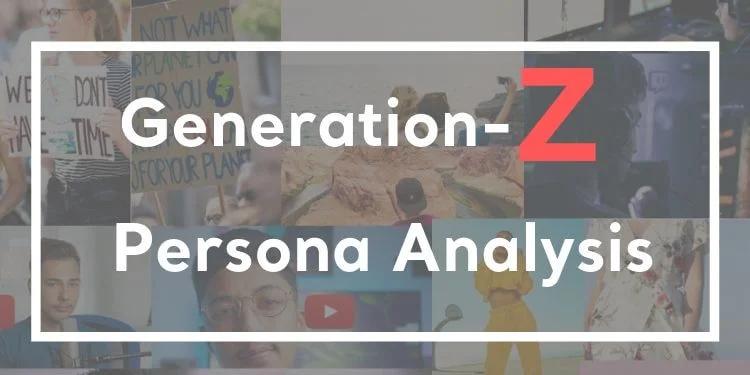Gen Z Persona Analysis: Who are they?
Feb 27, 2026 - 8 minute read
Generation Z /jeh·nuh·rei·shn zed/
The generation reaching adulthood in the second decade of the 21st century, perceived as being familiar with the Internet from a very young age.
In an era of fake news, and the filter bubble, Gen Z is more likely to be able to push through the noise. Not only are they able to consume more information than any group before, they have also become accustomed to cutting through it. They are perhaps the most brand-critical, bullshit-repellent, questioning group around and will call out any behavior they dislike on social media. -Lucie Greene
Introduction to Gen Z
Generation Z, often referred to as Gen Z, represents the cohort of individuals born in the late 1990s to early 2000s. Today, they are the 13 to 21 age group, constituting nearly one-third of the global population. For businesses, this isn't just a significant statistic; it's a crucial insight into the future of consumer behavior and workforce dynamics. Unlike previous generations who occupy familiar spaces in commerce and culture, Gen Z is already here, actively shaping markets and trends.
Understanding Gen Z is not optional for forward-thinking companies; it's imperative. While Millennials (now aged 22 to 37), Generation X (aged 38 to 53), and Baby Boomers (aged 54 to 72) have their own distinctive characteristics, Gen Z is poised to overtake both in demographic size and economic influence. They are rapidly becoming the largest living generation, and more importantly, they are digital natives.
Unlike their predecessors who had to adapt and learn about digital technology, Gen Z was born into a world where the Internet, smartphones, and social media were already prevalent. This fundamentally alters how they interact with technology—they are not just users but native inhabitants of the digital realm. Their comfort with digital platforms makes them remarkably engaging consumers, especially on social media, where they seamlessly navigate and influence trends.
For businesses aiming to capture the attention of Gen Z through public relations and marketing efforts, a deep understanding of this generation’s unique traits and preferences is essential. This demographic requires more than traditional outreach strategies; they demand authenticity, creativity, and engagement across digital spaces. As they continue to shape the present and define the future, businesses must adapt to meet the expectations of Gen Z, ensuring that their strategies align with the values and digital fluency of this dynamic group. By gaining insights into who Gen Z really is, businesses can effectively engage with this influential generation, building lasting relationships that transcend mere transactional interactions.
Demographics and Interests of Gen Z
Generation Z stands out not only due to their unique technological upbringing but also because of their demographic and behavioral nuances. When examining the Gen Z audience engaging online, we find a near-even gender distribution, with 51% female and 49% male. This balanced representation contributes to diverse viewpoints and preferences within the generation. According to research by the Pew Research Center, Gen Z is marked as the most racially and ethnically diverse generation to date. This diversity is mirrored in their broad range of interests and interactions in digital spaces.
Gen Z is also on the cusp of becoming the best-educated generation, highlighting their pursuit of knowledge and understanding in various fields. This commitment to education is reflected in their online engagements, which are generally positive. Approximately 60% of their online interactions convey positivity, with emotions like love (20%), joy (13%), anticipation (13%), and trust (11%) leading the spectrum. Negative emotions have a smaller, albeit notable, presence, with hate at 10% and anger at 9%.
In terms of interests, television captivates a significant portion of Gen Z, with 50% showing an inclination towards TV shows and content. Clothing is another prominent interest, engaging 35% of Gen Z individuals, while 28% are drawn to music. Dating content engages 16% of them, while political content sparks the interest of 14%. Gen Z's willingness to discuss topics they care about sets them apart from the general population, indicating a proactive and engaged stance on issues that matter to them.
Target audience analysis of Gen Z reveals a generation that is deeply interconnected, diverse, and engaged. Understanding their balanced gender representation, cultural diversity, and the positive nature of their online interactions allows businesses to tailor strategies that resonate authentically with this group. By aligning marketing efforts with their primary interests and values, companies can foster meaningful connections with Gen Z, ensuring that their brand remains relevant and desirable to this influential demographic.
Characteristics of Gen Z
Understanding the characteristics of Generation Z is essential for businesses seeking to engage with this dynamic group. Gen Z's distinct qualities influence their behaviors, preferences, and how they interact with the world around them.
Activism-Driven
Gen Z is a generation of activists, unafraid to take strong stances on political and social matters. They are notably LGBTQ+ friendly and vocally support the community, particularly in times of conflict. Their love for animals often translates into a preference for rescuing and adopting rather than purchasing pets. Environmental sensitivity is another hallmark of Gen Z, as evidenced by their admiration for brands like Patagonia, which pledges 1% of its sales to environmental causes—a resonant action for this eco-conscious generation.

Love for Travel
Research by Travel Weekly highlights that Gen Z is more drawn to travel than any previous generation, and they frequently influence family travel decisions. While 40% prefer budget-friendly travel options such as hostels, others gravitate towards luxury travel and resorts (31%) or all-inclusive trips and cruises (29%). For Gen Z, travel is more than leisure; it's an escape from stress and anxiety, offering experiences that enrich their global perspective.

Entrepreneurial Spirit
With many Gen Z members being children of Millennials, they are acutely aware of student loan challenges and often do not consider college a necessity. Instead, they embrace entrepreneurship, showing interest in cryptocurrencies like Bitcoin and seeking to build online businesses. Remarkably, 71% watch over three hours of online videos daily, with 30% expressing interest in content creation. A significant number aspire to be YouTubers, with some Gen Z entrepreneurs already earning substantial incomes from their YouTube ventures.

Passion for Gaming
Gen Z members love video games, just like their parents. A Google report shows that Gen Z members think video games are "the coolest," and they own more console games than their parents did. However, unlike their Millennial parents, Gen Z members are not just players. They also watch and stream video games, mostly on Twitch. Another interesting note is that Twitchers are three times more likely to listen to music.

Affinity for Fashion
More than one-third of Gen Z audiences talk about clothing and fashion. Their favorite brands are Sephora, Fenty, MAC, NYX, Kylie, and Tarte. They also love to talk about Christian Dior, Dolce % Gabbana, Nike, Adidas, and Gucci. Gen Z members who are talking about clothing and fashion are also very interested in LGBTQ+, dating, music, and pop culture.

Use Text Analysis to Understand Gen Z
For marketers and researchers, merely understanding the lifestyle of Generation Z isn't enough to effectively engage with this dynamic cohort. It is essential to delve deeper into their communications—analyzing their texts to uncover motivations, barriers, and complaints. This is where customer feedback analysis becomes a crucial tool.
In the digital age, customer feedback is invaluable, offering unprecedented insights into user preferences and areas for improvement. Such feedback guides app developers and businesses in refining products and enhancing user experiences. However, efficiently tapping into this ocean of insights, especially from platforms like Amazon, Google Business, and Trustpilot, can be challenging. Reviews from Apple’s App Store, Google Play, social media mentions, and discussion forums are treasure troves for understanding your target audience—Gen Z included.
AI-powered tools like Kimola play a pivotal role in transforming customer feedback into actionable market insights. Utilizing machine learning algorithms and Natural Language Processing (NLP), Kimola excels in dissecting and interpreting vast amounts of unstructured data through advanced text analysis. This eliminates the cumbersome task of manually sifting through reviews, as Kimola seamlessly scrapes data from platforms like the Google Play Store and Apple App Store to gather and analyze customer opinions. What distinguishes Kimola is its capacity to analyze data using dynamic classification technology, which does not depend on pre-existing training data. This sophisticated AI swiftly identifies patterns, sentiments, and themes, offering businesses valuable insights from the very outset.
Kimola offers versatile solutions tailored to diverse business needs. For rapid, one-off analyses, Kimola.com provides dynamic classification, generating actionable insights swiftly by entering links from review sites or app stores. For those needing a deeper analysis, Kimola offers multi-label classification and aspect-based sentiment analysis. It turns user-uploaded Excel spreadsheets into rich sources of information, allowing for a comprehensive examination of the data.
Beyond analysis, Kimola facilitates the extraction and integration of insights with features like executive summaries and FAQs, ensuring that crucial insights are easily incorporated into presentations. The platform allows for seamless exporting of findings in formats such as PPT, Excel, and PDF, simplifying reporting and sharing processes.
By leveraging platforms and tools like Kimola, businesses can convert customer feedback into strategic assets—enhancing their competitive advantage in the bustling market. Transforming raw feedback into strategic decision-making tools, businesses are better positioned to engage with Gen Z effectively, navigating the ever-evolving industry landscape with insights that truly resonate.








